介词用法大全
- 格式:doc
- 大小:35.50 KB
- 文档页数:6
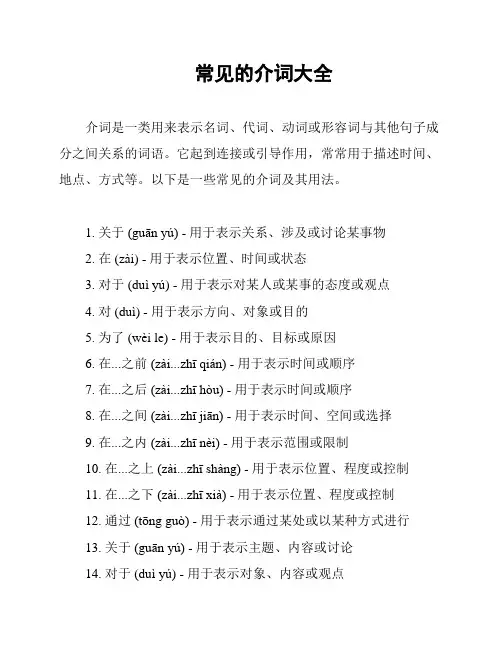
常见的介词大全介词是一类用来表示名词、代词、动词或形容词与其他句子成分之间关系的词语。
它起到连接或引导作用,常常用于描述时间、地点、方式等。
以下是一些常见的介词及其用法。
1. 关于(guān yú) - 用于表示关系、涉及或讨论某事物2. 在 (zài) - 用于表示位置、时间或状态3. 对于 (duì yú) - 用于表示对某人或某事的态度或观点4. 对 (duì) - 用于表示方向、对象或目的5. 为了 (wèi le) - 用于表示目的、目标或原因6. 在...之前(zài...zhī qián) - 用于表示时间或顺序7. 在...之后(zài...zhī hòu) - 用于表示时间或顺序8. 在...之间(zài...zhī jiān) - 用于表示时间、空间或选择9. 在...之内(zài...zhī nèi) - 用于表示范围或限制10. 在...之上(zài...zhī shàng) - 用于表示位置、程度或控制11. 在...之下(zài...zhī xià) - 用于表示位置、程度或控制12. 通过(tōng guò) - 用于表示通过某处或以某种方式进行13. 关于(guān yú) - 用于表示主题、内容或讨论14. 对于 (duì yú) - 用于表示对象、内容或观点15. 针对(zhēn duì) - 用于表示目标或针对特定情况16. 根据(gēn jù) - 用于表示依据、基础或原因17. 按照 (àn zhào) - 用于表示照着顺序、方法或规则18. 跟随(gēn suí) - 用于表示后继或紧随19. 靠近 (kào jìn) - 用于表示接近或附近20. 近 (jìn) - 用于表示时间、距离或关系请注意,以上只是一些常见的介词,还有许多其他介词可根据具体语境来使用。
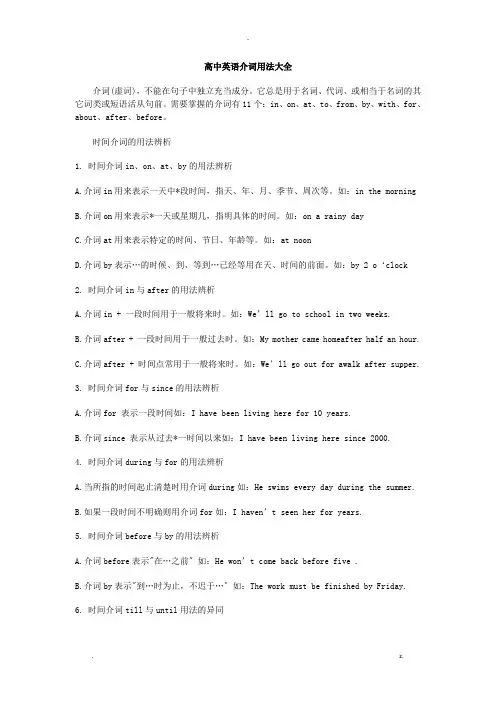
高中英语介词用法大全介词(虚词),不能在句子中独立充当成分。
它总是用于名词、代词、或相当于名词的其它词类或短语活从句前。
需要掌握的介词有11个:in、on、at、to、from、by、with、for、about、after、before。
时间介词的用法辨析1. 时间介词in、on、at、by的用法辨析A.介词in用来表示一天中*段时间,指天、年、月、季节、周次等。
如:in the morningB.介词on用来表示*一天或星期几,指明具体的时间。
如:on a rainy dayC.介词at用来表示特定的时间、节日、年龄等。
如:at noonD.介词by表示…的时候、到、等到…已经等用在天、时间的前面。
如:by 2 o‘clock2. 时间介词in与after的用法辨析A.介词in + 一段时间用于一般将来时。
如:We’ll go to school in two weeks.B.介词after + 一段时间用于一般过去时。
如:My mother came homeafter half an hour.C.介词after + 时间点常用于一般将来时。
如:We’ll go out for awalk after supper.3. 时间介词for与since的用法辨析A.介词for 表示一段时间如:I have been living here for 10 years.B.介词since 表示从过去*一时间以来如:I have been living here since 2000.4. 时间介词during与for的用法辨析A.当所指的时间起止清楚时用介词during如:He swims every day during the summer.B.如果一段时间不明确则用介词for如:I haven’t seen her for years.5. 时间介词before与by的用法辨析A.介词before表示"在…之前〞如:He won’t come back before five .B.介词by表示"到…时为止,不迟于…〞如:The work must be finished by Friday.6. 时间介词till与until用法的异同和until用在肯定句中,均可表示"直到…为止〞,如:I will waittill(until)seveno'clock.和until用在否认句中,均可表示"在…以前〞或"直到…才〞。
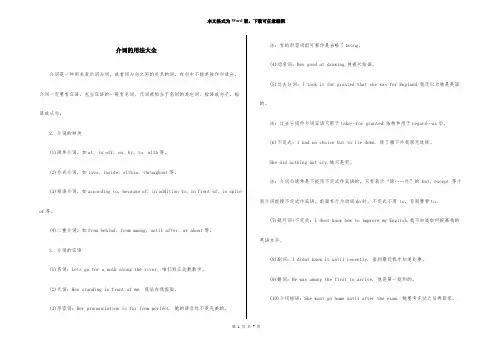
介词的用法大全介词是一种用来表示词与词, 或者词与句之间的关系的词,在句中不能单独作句成分。
介词一定要有宾语,充当宾语的一般有名词、代词或相当于名词的其它词、短语或句子,短语或从句。
2. 介词的种类(1)简单介词,如at, in off, on, by, to, with等。
(2)合成介词,如into, inside, within, throughout等。
(3)短语介词,如according to, because of, in addition to, in front of, in spite of等。
(4)二重介词,如from behind, from among, until after, at about等。
3. 介词的宾语(1)名词:Lets go for a walk along the river. 咱们到江边散散步。
(2)代词:Hes standing in front of me. 我站在我前面。
(3)形容词:Her pronunciation is far from perfect. 她的语音远不是完美的。
注:有的形容词前可看作是省略了being。
(4)动名词:Hes good at drawing.他善长绘画。
(5)过去分词:I took it for granted that she was for England.我还以为她是英国的。
注:过去分词作介词宾语只限于take…for granted 结构和用于regard…as后。
(6)不定式:I had no choice but to lie down. 除了躺下外我别无选择。
She did nothing but cry.她只是哭。
注:介词后通常是不能用不定式作宾语的,只有表示“除……外”的 but, except 等个别介词能接不定式作宾语。
前面有行为动词do时,不定式不用 to,否则要带to。
(7)疑问词+不定式:I dont know how to improve my English.我不知道如何提高我的英语水平。
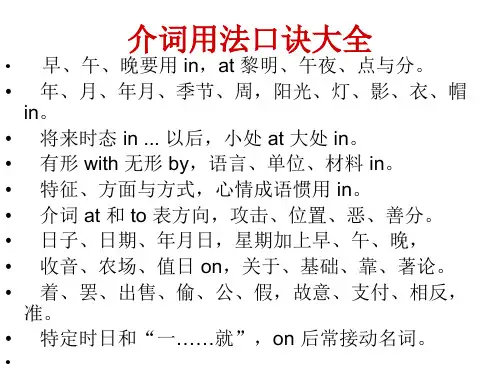
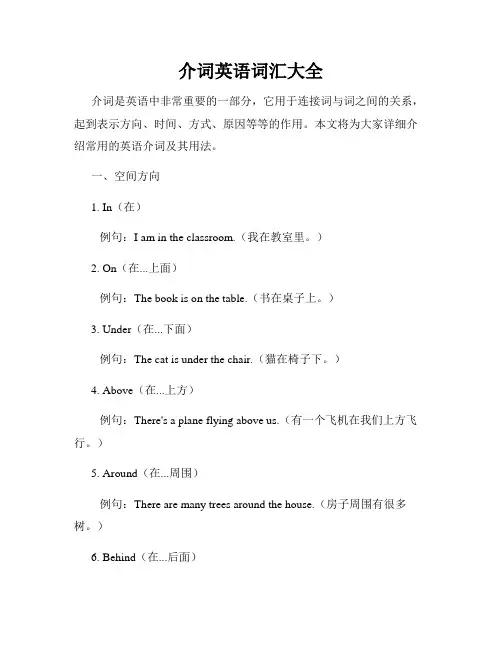
介词英语词汇大全介词是英语中非常重要的一部分,它用于连接词与词之间的关系,起到表示方向、时间、方式、原因等等的作用。
本文将为大家详细介绍常用的英语介词及其用法。
一、空间方向1. In(在)例句:I am in the classroom.(我在教室里。
)2. On(在...上面)例句:The book is on the table.(书在桌子上。
)3. Under(在...下面)例句:The cat is under the chair.(猫在椅子下。
)4. Above(在...上方)例句:There's a plane flying above us.(有一个飞机在我们上方飞行。
)5. Around(在...周围)例句:There are many trees around the house.(房子周围有很多树。
)6. Behind(在...后面)例句:The car is behind the building.(车在建筑物后面。
)7. Beside(在...旁边)例句:She sat beside her friend.(她坐在她朋友旁边。
)二、时间关系1. At(在某个具体时间)例句:He will arrive at 8 o'clock.(他将在8点到达。
)2. On(在某一天)例句:We have a meeting on Monday.(我们星期一有个会议。
)3. In(在某个时间段)例句:I will meet her in an hour.(我将在一个小时后见她。
)4. Before(在...之前)例句:Please finish your homework before dinner.(请在晚饭前完成作业。
)5. After(在...之后)例句:We will have a party after the concert.(音乐会之后我们将举办派对。
)三、方式和方式1. With(用;以...方式)例句:She wrote the letter with a pen.(她用钢笔写信。
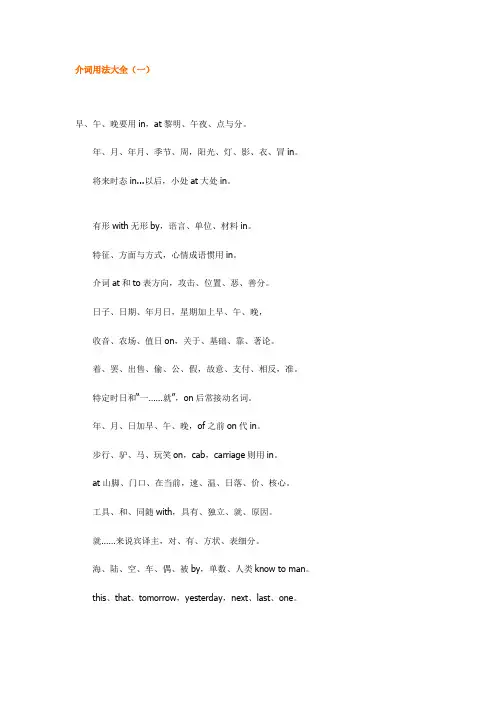
介词用法大全(一)早、午、晚要用in,at黎明、午夜、点与分。
年、月、年月、季节、周,阳光、灯、影、衣、冒in。
将来时态in...以后,小处at大处in。
有形with无形by,语言、单位、材料in。
特征、方面与方式,心情成语惯用in。
介词at和to表方向,攻击、位置、恶、善分。
日子、日期、年月日,星期加上早、午、晚,收音、农场、值日on,关于、基础、靠、著论。
着、罢、出售、偷、公、假,故意、支付、相反,准。
特定时日和“一……就”,on后常接动名词。
年、月、日加早、午、晚,of之前on代in。
步行、驴、马、玩笑on,cab,carriage则用in。
at山脚、门口、在当前,速、温、日落、价、核心。
工具、和、同随with,具有、独立、就、原因。
就……来说宾译主,对、有、方状、表细分。
海、陆、空、车、偶、被by,单数、人类know to man。
this、that、tomorrow,yesterday,next、last、one。
接年、月、季、星期、周,介词省略已习惯。
over、under正上下,above、below则不然,若与数量词连用,混合使用亦无关。
…beyond超出、无、不能,against靠着,对与反。
besides,except分内外,among之内along沿。
同类比较except,加for异类记心间。
原状because of,、owing to、due to表语形容词under后接修、建中,of、from物、化分。
before、after表一点, ago、later表一段。
before能接完成时,ago过去极有限。
since以来during间,since时态多变换。
与之相比beside,除了last but one。
复不定for、找、价、原,对、给、段、去、为、作、赞。
快到、对、向towards,工、学、军、城、北、上、南。
but for否定用虚拟,复合介词待后言。
ing型由于鉴,除了除外与包合。
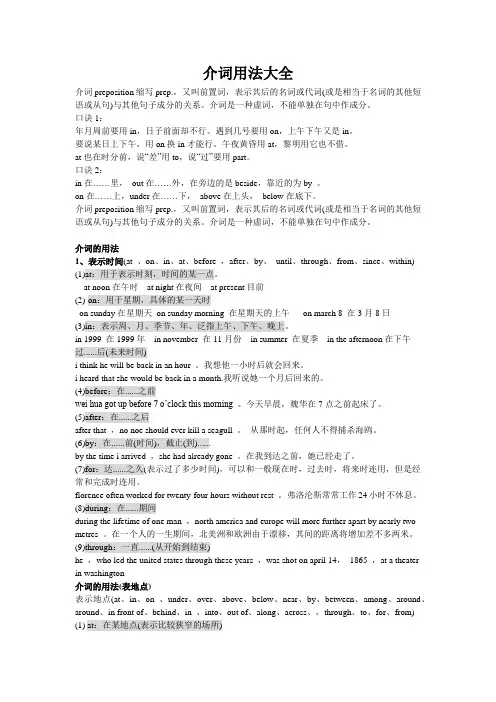
介词用法大全介词preposition缩写prep.,又叫前置词,表示其后的名词或代词(或是相当于名词的其他短语或从句)与其他句子成分的关系。
介词是一种虚词,不能单独在句中作成分。
口诀1:年月周前要用in,日子前面却不行。
遇到几号要用on,上午下午又是in。
要说某日上下午,用on换in才能行。
午夜黄昏用at,黎明用它也不借。
at也在时分前,说“差”用to,说“过”要用part。
口诀2:in在……里,out在……外,在旁边的是beside,靠近的为by 。
on在……上,under在……下,above在上头,below在底下。
介词preposition缩写prep.,又叫前置词,表示其后的名词或代词(或是相当于名词的其他短语或从句)与其他句子成分的关系。
介词是一种虚词,不能单独在句中作成分。
介词的用法1、表示时间(at 、on、in、at、before ,after、by、until、through、from、since、within) (1)at:用于表示时刻,时间的某一点。
at noon在午时at night在夜间at present目前(2)on:用于星期,具体的某一天时on sunday在星期天on sunday morning 在星期天的上午on march 8 在3月8日(3)in:表示周、月、季节、年、泛指上午、下午、晚上。
in 1999 在1999年in november 在11月份in summer 在夏季in the afternoon在下午过......后(未来时间)i think he will be back in an hour 。
我想他一小时后就会回来。
i heard that she would be back in a month.我听说她一个月后回来的。
(4)before:在......之前wei hua got up before 7 o’clock this morning 。
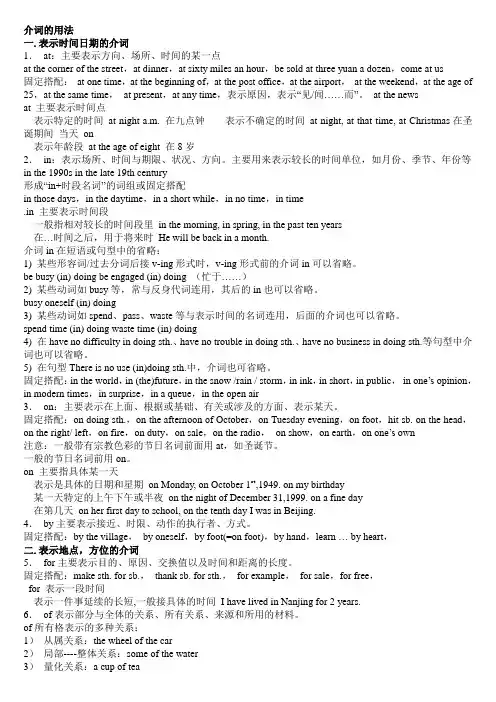
介词的用法一.表示时间日期的介词1.at:主要表示方向、场所、时间的某一点at the corner of the street,at dinner,at sixty miles an hour,be sold at three yuan a dozen,come at us固定搭配:at one time,at the beginning of,at the post office,at the airport,at the weekend,at the age of 25,at the same time,at present,at any time,表示原因,表示“见/闻……而”。
at the newsat 主要表示时间点表示特定的时间at night a.m. 在九点钟表示不确定的时间at night, at that time, at Christmas在圣诞期间当天on表示年龄段at the age of eight 在8岁2.in:表示场所、时间与期限、状况、方向。
主要用来表示较长的时间单位,如月份、季节、年份等in the 1990s in the late 19th century形成“in+时段名词”的词组或固定搭配in those days,in the daytime,in a short while,in no time,in time.in 主要表示时间段一般指相对较长的时间段里in the morning, in spring, in the past ten years在…时间之后,用于将来时He will be back in a month.介词in在短语或句型中的省略:1) 某些形容词/过去分词后接v-ing形式时,v-ing形式前的介词in可以省略。
be busy (in) doing be engaged (in) doing (忙于……)2) 某些动词如busy等,常与反身代词连用,其后的in也可以省略。
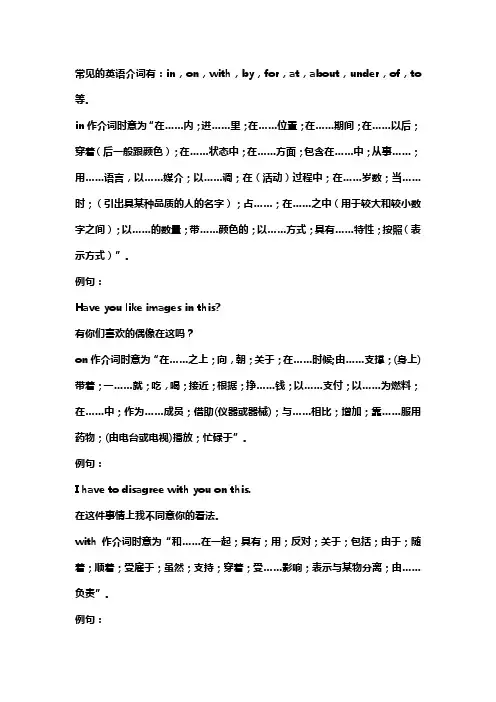
常见的英语介词有:in,on,with,by,for,at,about,under,of,to 等。
in作介词时意为“在……内;进……里;在……位置;在……期间;在……以后;穿着(后一般跟颜色);在……状态中;在……方面;包含在……中;从事……;用……语言,以……媒介;以……调;在(活动)过程中;在……岁数;当……时;(引出具某种品质的人的名字);占……;在……之中(用于较大和较小数字之间);以……的数量;带……颜色的;以……方式;具有……特性;按照(表示方式)”。
例句:Have you like images in this?有你们喜欢的偶像在这吗?on作介词时意为“在……之上;向,朝;关于;在……时候;由……支撑;(身上)带着;一……就;吃,喝;接近;根据;挣……钱;以……支付;以……为燃料;在……中;作为……成员;借助(仪器或器械);与……相比;增加;靠……服用药物;(由电台或电视)播放;忙碌于”。
例句:I have to disagree with you on this.在这件事情上我不同意你的看法。
with作介词时意为“和……在一起;具有;用;反对;关于;包括;由于;随着;顺着;受雇于;虽然;支持;穿着;受……影响;表示与某物分离;由……负责”。
例句:I am one with you on this.在这一点上,我和你的意见是一致的。
by作介词时意思是“由,被;通过;相差……;到……之前;在……旁边”。
例句:The telephone is by the window.电话在窗户旁边。
for作介词的时候,它翻译为“(表示对象、用途等)给,对;为了;关于;代表;受雇于;意思是;支持;因为;为得到;换取;就……而言;……后(更好、更快乐等);(表示去向)往;(安排或预定)在……时;对(某人)来说(困难、必需、愉快等);以……为价格;(表示一段时间)计;表示一系列事件之一。
例句:Can you translate this letter for me?你能为我翻译这封信吗?at(表示位置)在;在(某时间或时刻);以,达;向,朝。
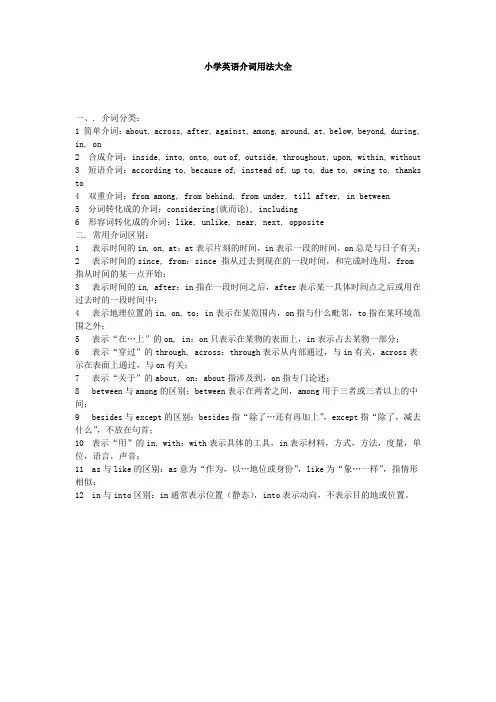
小学英语介词用法大全一、. 介词分类:1 简单介词:about, across, after, against, among, around, at, below, beyond, during, in, on2 合成介词:inside, into, onto, out of, outside, throughout, upon, within, without3 短语介词:according to, because of, instead of, up to, due to, owing to, thanks to4 双重介词:from among, from behind, from under, till after, in between5 分词转化成的介词:considering(就而论), including6 形容词转化成的介词:like, unlike, near, next, opposite二. 常用介词区别:1 表示时间的in, on, at:at表示片刻的时间,in表示一段的时间,on总是与日子有关;2 表示时间的since, from:since 指从过去到现在的一段时间,和完成时连用,from指从时间的某一点开始;3 表示时间的in, after:in指在一段时间之后,after表示某一具体时间点之后或用在过去时的一段时间中;4 表示地理位置的in, on, to:in表示在某范围内,on指与什么毗邻,to指在某环境范围之外;5 表示“在…上”的on, in:on只表示在某物的表面上,in表示占去某物一部分;6 表示“穿过”的through, across:through表示从内部通过,与in有关,across表示在表面上通过,与on有关;7 表示“关于”的about, on:about指涉及到,on指专门论述;8 between与among的区别:between表示在两者之间,among用于三者或三者以上的中间;9 besides与except的区别:besides指“除了…还有再加上”,except指“除了,减去什么”,不放在句首;10 表示“用”的in, with:with表示具体的工具,in表示材料,方式,方法,度量,单位,语言,声音;11 as与like的区别:as意为“作为,以…地位或身份”,like为“象…一样”,指情形相似;12 in与into区别:in通常表示位置(静态),into表示动向,不表示目的地或位置。
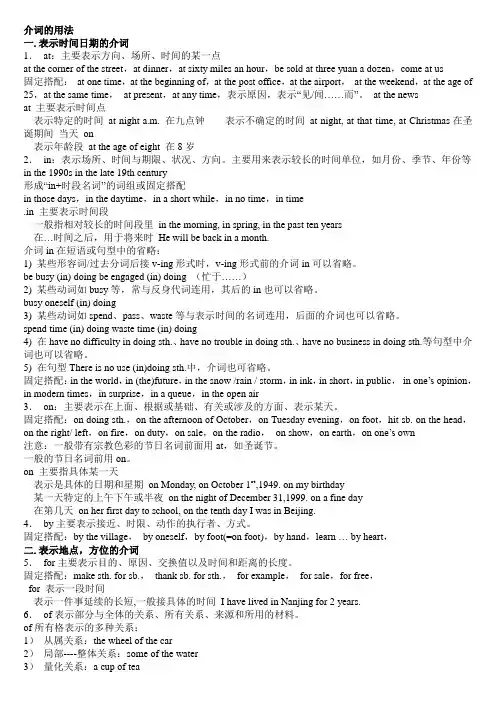
介词的用法一.表示时间日期的介词1.at:主要表示方向、场所、时间的某一点at the corner of the street,at dinner,at sixty miles an hour,be sold at three yuan a dozen,come at us固定搭配:at one time,at the beginning of,at the post office,at the airport,at the weekend,at the age of 25,at the same time,at present,at any time,表示原因,表示“见/闻……而”。
at the newsat 主要表示时间点表示特定的时间at night a.m. 在九点钟表示不确定的时间at night, at that time, at Christmas在圣诞期间当天on表示年龄段at the age of eight 在8岁2.in:表示场所、时间与期限、状况、方向。
主要用来表示较长的时间单位,如月份、季节、年份等in the 1990s in the late 19th century形成“in+时段名词”的词组或固定搭配in those days,in the daytime,in a short while,in no time,in time.in 主要表示时间段一般指相对较长的时间段里in the morning, in spring, in the past ten years在…时间之后,用于将来时He will be back in a month.介词in在短语或句型中的省略:1) 某些形容词/过去分词后接v-ing形式时,v-ing形式前的介词in可以省略。
be busy (in) doing be engaged (in) doing (忙于……)2) 某些动词如busy等,常与反身代词连用,其后的in也可以省略。
介词的用法总结大全介词是连接名词、代词、动词或副词与其他部分的词类,用来表示位置、方向、时间、原因、目的、手段等关系。
以下是介词的用法总结:位置和方向:1. at:表示位置处于一些地点、其中一层次或其中一方向。
例如:at home(在家);at the top(在顶部)。
2. in:表示位置在一些区域、一些空间范围内。
例如:in the park (在公园里);in a box(在盒子里)。
3. on:表示位置在一些平面、表面上。
例如:on the table(在桌子上);on the wall(在墙上)。
时间:1. at:表示具体的时刻或一些时间点。
例如:at 9 o'clock(在九点钟);at noon(在中午)。
2. in:表示段时间的范围、一些季节、其中一年份或测算未来时间的过程。
例如:in May(在五月);in the 1990s(在20世纪90年代)。
3. on:表示一些具体的日期或星期几。
例如:on Monday(在星期一);on June 1st(在六月一日)。
原因和结果:2. due to:表示由于一些原因引起的结果,通常用于正式场合。
例如:The delay was due to technical problems(延误是由技术问题引起的)。
目的和目标:1. for:表示为了一些目的或目标。
例如:He studied hard for the exam(他为了考试而努力学习)。
2. to:表示向一些目的地或一些人传递信息等。
例如:I went to the supermarket to buy some groceries(我去超市买些杂货)。
手段和方法:1. with:表示使用其中一种工具、手段或方法。
例如:She cut the cake with a knife(她用刀切蛋糕)。
2. by:表示通过其中一种手段或方法。
例如:We traveled to the city by train(我们乘火车去了城市)。
介词用法大全介词preposition缩写prep.,又叫前置词,表示其后的名词或代词(或是相当于名词的其他短语或从句)与其他句子成分的关系。
介词是一种虚词,不能单独在句中作成分。
口诀1:年月周前要用in,日子前面却不行。
遇到几号要用on,上午下午又是in。
要说某日上下午,用on换in才能行。
午夜黄昏用at,黎明用它也不借。
at也在时分前,说“差”用to,说“过”要用part。
口诀2:in在……里,out在……外,在旁边的是beside,靠近的为by 。
on在……上,under在……下,above在上头,below在底下。
介词preposition缩写prep.,又叫前置词,表示其后的名词或代词(或是相当于名词的其他短语或从句)与其他句子成分的关系。
介词是一种虚词,不能单独在句中作成分。
介词的用法1、表示时间的(at 、on、in、at、before ,after、by、until、through、from、since、within)(1)at:用于表示时刻,时间的某一点。
at noon在午时at night在夜间at present目前(2)on:用于星期,某天,某一天的上午、下午、晚上(指具体的某一天时,一律用) on sunday在星期天on sunday morning 在星期天的上午on march 8 在3月8日(3)in:用于表示周、月、季节、年、泛指上午、下午、晚上。
in 1999 在1999年in november 在11月份in summer 在夏季in the afternoon在下午过......后(未来时间)i think he will be back in an hour 。
我想他一小时后就会回来。
i heard that she would be back in a month.我听说她一个月后回来的。
(4)before:在......之前wei hua got up before 7 o’clock this morning 。
介词的用法一.表示时间日期的介词1.at:主要表示方向、场所、时间的某一点at the corner of the street,at dinner,at sixty miles an hour,be sold at three yuan a dozen,come at us固定搭配:at one time,at the beginning of,at the post office,at the airport,at the weekend,at the age of 25,at the same time,at present,at any time,表示原因,表示“见/闻……而”。
at the newsat 主要表示时间点表示特定的时间at night a.m. 在九点钟表示不确定的时间at night, at that time, at Christmas在圣诞期间当天on表示年龄段at the age of eight 在8岁2.in:表示场所、时间与期限、状况、方向。
主要用来表示较长的时间单位,如月份、季节、年份等in the 1990s in the late 19th century形成“in+时段名词”的词组或固定搭配in those days,in the daytime,in a short while,in no time,in time.in 主要表示时间段一般指相对较长的时间段里in the morning, in spring, in the past ten years在…时间之后,用于将来时He will be back in a month.介词in在短语或句型中的省略:1) 某些形容词/过去分词后接v-ing形式时,v-ing形式前的介词in可以省略。
be busy (in) doing be engaged (in) doing (忙于……)2) 某些动词如busy等,常与反身代词连用,其后的in也可以省略。
介词用法口诀大全早、午、晚要用in,at 黎明、午夜、点与分。
年、月、年月、季节、周,阳光、灯、影、衣、帽in。
将来时态in ... 以后,小处at 大处in。
有形with 无形by,语言、单位、材料in。
特征、方面与方式,心情成语惯用in。
介词at 和to 表方向,攻击、位置、恶、善分。
日子、日期、年月日,星期加上早、午、晚,收音、农场、值日on,关于、基础、靠、著论。
着、罢、出售、偷、公、假,故意、支付、相反,准。
特定时日和“一……就”,on 后常接动名词。
年、月、日加早、午、晚,of 之前on 代in。
步行、驴、马、玩笑on,cab,carriage 则用in。
at 山脚、门口、在当前,速、温、日落、价、核心。
工具、和、同随with,具有、独立、就、原因。
就……来说宾译主,对、有、方状、表细分。
海、陆、空、车、偶、被by,单数、人类know to man。
this、that、tomorrow,yesterday,next、last、one。
接年、月、季、星期、周,介词省略已习惯。
over、under 正上下,above、below 则不然,若与数量词连用,混合使用亦无关。
beyond 超出、无、不能,against 靠着,对与反。
besides,except 分内外,among 之内along 沿。
同类比较except,加for 异类记心间。
原状because of, owing to,due to 表语形容词。
Under 后接修、建中,of,from 物、化分。
Before,after 表一点, ago,later 表一段。
before 能接完成时,ago 过去极有限。
since 以来during 间,since 时态多变换。
与之相比beside,除了last but one。
复不定for、找、价、原,对、给、段、去、为、作、赞。
快到、对、向towards,工、学、军、城、北、上、南。
but for 否定用虚拟,复合介词待后言。
英语介词用法大全一、介词preposition缩写prep,又叫前置词,表示其后的名词或代词(或是相当于名词的其他短语或从句)与其他句子成分的关系。
介词是一种虚词,不能单独在句中作成分。
二. 常用介词用法区分:1、in, on, to表示地理位置:in表示在某范围内,on指与什么毗邻,to指在某环境范围之外;2、on, in表示“在…上”时:on只表示在某物的表面上,in表示占去某物一部分;3、through, across都表示“穿过”时:through表示从内部通过,与in有关,across表示在表面上通过,与on有关;4、since, from表示表示时间时:since 指从过去到现在的一段时间,和完成时连用,from指从时间的某一点开始;5、in, on, at表示时间时:at表示片刻的时间,in表示一段的时间,on总是与日子有关;6、in, after表示时间时:in指在一段时间之后,after表示某一具体时间点之后或用在过去时的一段时间中;7、about, on表示“关于”时:about指涉及到,on指专门论述;8、besides与except表示“除了”:besides指“除了…还有再加上”,except指“除了,减去什么”,不放在句首;9、between与among表示“在两者之间”:between表示在两者之间,among用于三者或三者以上的中间;10、in, with表示“用”时:with表示具体的工具,in表示材料,方式,方法,度量,单位,语言,声音;11、in与into表示在里面:in通常表示位置(静态),into表示动向,不表示目的地或位置。
12、as与like:as意为“作为,以…地位或身份”,like为“象…一样”,指情形相似;三、介词用法口诀1、年月周前要用in,遇到几号用on,上午下午又是in.要说某日上下午,on换成in,午夜黄昏用at,黎明用它也不借。
at也在时分前,说“差”要用to,说“过”用part。
介词的用法总结大全介词是连接名词、代词、动词或介词短语等的词,表示它们之间的关系。
下面是介词的用法总结:1.表示位置或方向:- in(在...里面):in the box(在盒子里)- on(在...上面):on the table(在桌子上)- at(在...处):at the park(在公园)2.表示时间:- in(在...之前或之后一段时间):in the morning(早上)- on(在...的具体日期或其中一天):on Monday(星期一)- at(在其中一具体时刻):at 3 o'clock(在3点钟)3.表示原因或目的:- for(为了):I study hard for my future(为了我的未来,我努力学习)4.表示方式或手段:- by(用,由):I go to work by bus(我坐公交车去上班)- with(用,带有):He writes with a pen(他用钢笔写)5.表示比较:- than(比):He is taller than me(他比我高)- as(与...一样):He is as tall as me(他和我一样高)6.表示所属关系:- of(属于):the book of Peter(彼得的书)7.表示方法或手法:- in(用):write in pencil(用铅笔写)8.表示目的地或方位:- to(到):go to school(去学校)- towards(朝向):walk towards the river(朝河边走)9.表示条件:- if(如果):If it rains, we won't go out(如果下雨,我们就不会出去)10.表示比较:- like(像):He looks like his father(他长得像他父亲)11.表示由其中一种材料:- with(用):a bag made with leather(由皮革制成的包)12.表示途经或经过:- through(通过):go through the forest(穿过森林)13.表示对比或对立:- against(对抗):fight against the enemy(与敌人作战)14.表示关系或连接:- with(和):talk with friends(和朋友谈话)。
介词用法大全介词preposition缩写prep.,又叫前置词,表示其后的名词或代词(或是相当于名词的其他短语或从句)与其他句子成分的关系。
介词是一种虚词,不能单独在句中作成分。
口诀1:年月周前要用in,日子前面却不行。
遇到几号要用on,上午下午又是in。
要说某日上下午,用on换in才能行。
午夜黄昏用at,黎明用它也不借。
at也在时分前,说“差”用to,说“过”要用part。
口诀2:in在……里,out在……外,在旁边的是beside,靠近的为by 。
on在……上,under在……下,above在上头,below在底下。
介词preposition缩写prep.,又叫前置词,表示其后的名词或代词(或是相当于名词的其他短语或从句)与其他句子成分的关系。
介词是一种虚词,不能单独在句中作成分。
…介词的用法1、表示时间的(at 、on、in、at、before ,after、by、until、through、from、since、within)(1)at:用于表示时刻,时间的某一点。
at noon在午时at night在夜间at present目前(2)on:用于星期,某天,某一天的上午、下午、晚上(指具体的某一天时,一律用) on sunday在星期天on sunday morning 在星期天的上午on march 8 在3月8日(3)in:用于表示周、月、季节、年、泛指上午、下午、晚上。
in 1999 在1999年in november 在11月份in summer 在夏季in the afternoon在下午过......后(未来时间)(i think he will be back in an hour 。
我想他一小时后就会回来。
i heard that she would be back in a month.我听说她一个月后回来的。
(4)before:在......之前wei hua got up before 7 o’clock this morning 。
今天早晨,魏华在7点之前起床了。
(5)after:在......之后after that ,no noe should ever kill a seagull 。
从那时起,任何人不得捕杀海鸥。
(6)by:在......前(时间),截止(到)......by the time i arrived ,she had already gone 。
在我到达之前,她已经走了。
(7)for:达......之久(表示过了多少时间),可以和一般现在时,过去时,将来时连用,但是经常和完成时连用。
/florence often worked for twenty-four hours without rest 。
弗洛沦斯常常工作24小时而不休息。
(8)during:在......期间during the lifetime of one man ,north america and europe will more further apart by nearly two metres 。
在一个人的一生期间,北美洲和欧洲由于漂移,其间的距离将要增加差不多两米。
(9)through:一直......(从开始到结束)he ,who led the united states through these years ,was shot on april 14,1865 ,at a theater in washington介词的用法(表地点)表示地点(at、in、on 、under、over、above、below、near、by、between、among、around、around、in front of、behind、in 、into、out of、along、across、,through、to、for、from)(1) at:在某地点(表示比较狭窄的场所)%at school上学at home在家at 320 xinfu district 在新抚区320号at the station 在火车站(2)in:在某地(表示比较宽敞的场所)she will arrive in shanghai at ten .10点她将到达上海。
(3)表示地点方向的on ,under ,over ,above ,below①on:在......上面,有接触面on the table 在桌子上面②above:在......上方sometimes juliana could hear planes above the trees.有时朱莉安娜能听到树林上空的飞机声。
\③over:在......正上方,是under的反义词over these tombs ,they built pyramids 。
在这些坟墓上,他们建起了金字塔。
④under:在......下面,在......之内the twin sisters put the basket under the tree 。
这姐俩把篮子放到了树下。
⑤below:在......下方,(不一定是正下方)three thousand metres below her ,she could see nothing except the thick jungle 。
3000米以下,除了茂密的丛林之外,她什么也看不见。
(4)near ,by①near:近的,不远的(=not far)是的反义词,near还可以指时间,in the near future在不远的将来。
green’s lake was a small lake near his home 。
格林湖是他家附近的一个小湖。
;②by:在......旁边,比的距离要近juliana walked by the side of the river for six more long days 。
朱莉安娜沿着河岸又走了足足6天。
(5)between ,among ,around①between:在两者之间the differences between american english and british english are not very great 。
美国英语和英国英语之间的差别不是很大。
②among:在三者或者更多的之中there are some american students among us 。
在我们中间有几个美国学校。
③around:环绕,在...。
的周围,在......的四周they arrived at a valley with high mountains all around it 。
$他们到达了四周有高山环绕的山谷表示手段和材料的介词用(1)with①和……在一起these plates keep moving ,like great ships ,carrying the continents with them 。
这些板块载着各个大陆,像航船一样不断地漂移。
②具有,带有a person with good manners is always kind and polite.有礼貌的人总是和和气气,彬彬有礼的。
③用某种工具或方法#he could swim with some special swimming shoes.穿着一些特制的游泳鞋,他能游泳。
(2)in:表示用什么材料(例如:墨水,铅笔等)或用什么语言。
表示衣着,声调特点时,不用with而用in。
what’s this in english. 这个用英语怎么说(3)by:通过……方法,手段what do you mean by the word“island” “island”是什么意思i prefer traveling by train 。
我更喜欢乘火车旅行。
其他(1) of ,from①of 属于)……的,表示…。
的数量或种类…it was beginning of the term 。
这是学期开始的时候。
②from:来自(某地,某人),以…。
起始she is a lady from canada 。
她是一位加拿大的女士。
(2)without ,like ,as①without :没有,是with的反义词she often worked for twenty-four without rest 。
她通常工作24小时而不休息。
②like:像……一样like many children of her age ,ding fang is a young pioneer 。
像很多同龄的孩子一样同,丁芳是个少先队员。
③as:作为)they are carrying us as passengers.它们把我们当作乘客运载着。
(3)against:反对。
靠着everyone tried to fight against the locusts 。
所有的人奋力扑打蝗虫。
(4) about:① 关于,各处,四周nightingale wrote a book about nursing 。
南丁格尔写了一部关于护理方面的书。
② 询问某人,某物的情况或提出建议what about your family 你家里人怎么样辨析:,for ,from:①到达......地点(目的地)或方向where’s jack he has gone to london.杰克上哪了他去伦敦了。
②for:表示目的,为了......do you know what he comes here for 你知道他为什么来这儿吗③from:从......地点起how far is it from london to new york 从伦敦到纽约有多远3、表示手段和材料的介词用(1)with①和......在一起these plates keep moving ,like great ships ,carrying the continents with them 。
]这些板块载着各个大陆,像航船一样不断地漂移。
②具有,带有a person with good manners is always kind and polite.有礼貌的人总是和和气气,彬彬有礼的。
③用某种工具或方法he could swim with some special swimming shoes.穿着一些特制的游泳鞋,他能游泳。
(2)in:表示用什么材料(例如:墨水,铅笔等)或用什么语言。
表示衣着,声调特点时,不用with而用in。
what’s this in english. 这个用英语怎么说(3)by:通过......方法,手段?what do you mean by the word"island" "island"是什么意思i prefer traveling by train 。